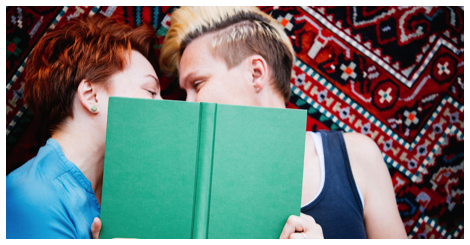
I Only Read Queer Romance and I Feel Great About It
I started reading romance just under one year ago. Since then, I have devoured romance across a wide variety of genres with happy abandon: contemporary, science fiction, fantasy, historical, paranormal, steampunk. I’ve read and enjoyed sports romances, holiday romances, romances that are also murder mysteries, romances set in bustling cities and in the rural Midwest. I’ve discovered that just about any sort or romance will do it for me—with one massive exception: romance starring straight people.
Give me queer people falling in love and getting it on. Women, men, and nonbinary folk of every identity, orientation, and gender—if the staring couple is queer, I’m in. Badass lesbian starship captains in space? Bring it on. Gay magicians in an alternate Victorian London? Absolutely. Trans college girls falling in love? Yes please. Two men who happen to be pickpockets navigating love and palace intrigue in a fantasy kingdom? Obviously. Lifelong gay besties discovering they were made for each other? Yessssss. Lesbian dancers in contemporary New York? Yup.
But straight people, in any century or universe, imagined or real? Not so much.
I didn’t make a unilateral decision not to read straight romance. It just happened. I am a queer human. It was natural, when I turned to romance novels for solace and escape, to read sexy love stories about other queer humans. But it’s been almost a year since I started reading romance, and since I’ve wholeheartedly fallen for the genre, and since I’m constantly recommending queer romance to straight people, it occurred to me a few weeks ago that maybe I ought to give heterosexual love (in romance novels, anyway), a try.
I turned to my fellow Rioters, obviously, searching back through Book Riot’s well-stocked archives of excellent romance booklists. I scribbled down a bunch of highly-recommended titles to start with, and told myself I’d read at least one before I picked up the next queer romance novel on my TBR.
I have not read a single one of those books.
In fact, every time I looked at the list, it filled me with dread. I really did not want to read any of those books, no matter how excellent they were. This got me thinking: why was I so determined to read a straight romance novel?
We live in a straight world, a world in which it remains, for many people, dangerous to be out, to be visibly queer or openly trans, to hold their partner’s hand in public. I am lucky to live in a place where being queer is not dangerous. But despite enormous and important progress, I’m well aware that my life is the exception, not the rule.
Less life-threatening, but still damaging, is the fact that mainstream culture values straight love over every other kind. Queer stories are still, for the most part, viewed as other. It is not hard, as a reader, to simply never read books staring queer people. Yes, there are plenty of acclaimed and bestselling books that have queer characters in them. But for every one of those books, there are five more without, and five more where the queer characters die, or the queer storyline revolves around violence and homophobia.
I read voraciously and eclectically. Some of my favorite novels are about straight people. There are scenes in Lois McMaster Bujold’s Shards of Honor (one of my favorite love stories of all time) that I have literally read hundreds of times. Matthew Griffin’s Hide, one of the best books I’ve read this year, is full of queer suffering—heartbreaking, but brilliant. My world (thankfully!) is full of all kinds of people and all kinds of love and all kinds of books. In my general reading life, I would never limit myself to only one kind of story.
But at a time in my life when I was feeling lost and lonely, I turned to queer romance novels for escape and comfort. Romance remains the one facet of my reading life that is purely and completely for pleasure. That’s not to say I’ve never learned anything from a romance novel, or that romance novels can’t have great writing and complicated characters (they have both). But unlike many of the other kinds of books I read, I turn to romance for one reason only: enjoyment. This is a beautiful thing. I have found a deep and abiding joy in stories about queer people finding both love and a happy ending. Why should I force myself to give that up? I don’t owe the straight world anything.
Perhaps, one day, I’ll decide to read straight romance. I know there are thousands of great straight romances out there. I know I’d probably enjoy many of them. But for now, for me, this one little corner of my reading life is queer-protagonists-only. Straight people get to be their friends, parents, children, siblings, colleagues, confidants. But they don’t get to be the main characters. They don’t get to be the stars of the show.
I exist, every day, in a straight world. And while my bit of the straight world is pretty damn queer, this is not the case for many people whom I love, and many thousands of others whom I do not know. We are surrounded by straight stories, and too often, the queer stories that get the most attention are stories of suffering, violence, trauma, loss, death. My decision to read only queer romance is not resistance; it is not an attack on straight people; it is not a political statement. It is simple, joyful, unabashed celebration—of queer love, queer brilliance, queer pleasure, and most of all, queer happily ever afters.













